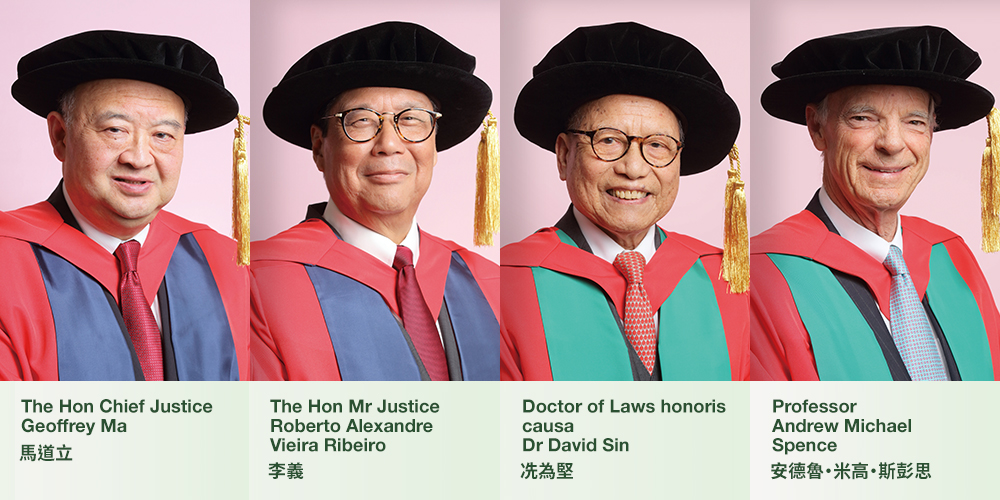
Doctor of Laws honoris causa
The Hon Chief Justice Geoffrey Ma 馬道立
Chief Justice Ma has presided over the Court of Final Appeal, Hong Kong’s highest court, since 2010. As a determined champion for the rule of law, a judge and leader of the Judiciary, he is, in the Platonic sense, one of our most accomplished public figures.
The Hon Mr Justice Roberto Alexandre Vieira Ribeiro 李義
Mr Justice Ribeiro has a formidable reputation both in Hong Kong and elsewhere in the common law world. He has made profoundly significant contributions to the jurisprudence of Hong Kong and common law in general.
Doctor of Social Sciences honoris causa
Dr David Sin 冼為堅
The Chairman of Myer Jewelry Manufacturer Limited is a business leader and advocate of higher education. The Sin Wai Kin Fund and Sin Wai Kin Distinguished Visiting Professorship in the Humanities were established to support the Hong Kong Institute for the Humanities and Social Sciences at HKU.
Professor Andrew Michael Spence 安德魯・米高・斯彭思
The Nobel Laureate in Economic Sciences is a world authority on growth in developing countries and on the convergence between advanced and developing economies. He is the Co-Chair of the Advisory Council of the Asia Global Institute, HKU.
The Hon Chief Justice Geoffrey Ma’s speech on behalf of the Honorary Graduates at the 201st Congregation on April 2, 2019
An Edited Extract: There should be not only a respect for one’s own rights and freedoms but also the rights and freedoms of others.
After all, the guarantee of equality emphasised and repeated in the Basic Law and in the Bill of Rights reflects the basic assumptions of tolerance, respect and compromise. These are the assumptions behind a sense of community.
For me, I regard the award of this degree as very much one which belongs to the Hong Kong Judiciary, which I represent. The importance of an independent judiciary to Hong Kong cannot be overstated. To start with, the Basic Law, the constitutional document that governs the Hong Kong Special Administrative Region (which, as its Preamble provides, was enacted by the National People’s Congress to ensure the implementation of the basic policies of the PRC regarding Hong Kong) states in three different articles that Hong Kong shall have independent judicial power. The Judicial Oath required to be taken by all judges provides that judges must “administer justice without fear or favour, self-interest or deceit”.
Independence of the Judiciary is essential when dealing with the many complex legal issues before the courts. In the area of public law, where the public interest is engaged, cases often involve the Government and public authorities. There is little doubt that, like society in general, the law and the cases handled by the courts have become much more complex than before. This is inevitable when we see the growth of the community through the years: in 1841, the population of Hong Kong was 7,450; at the turn of the 20th century, in 1901, it had risen to 283,978; after the 2nd World War, in 1950, it was 2.2 million; in 2001, the population had become 6.7 million; and it is now about 7.5 million. When one adds to this the greater awareness, particularly after July 1, 1997, of political, economic and social dimensions, it is easy to infer that life in general has become more complex.
I have earlier mentioned public law cases. These are cases which sometimes originate from political, economic or social controversies, on which members of the public may have strong views. These views are often diverse and at odds with one another, and at times seemingly impossible to reconcile. The various freedoms and rights that are enumerated in the Basic Law are not always easy to apply and, as a matter of law, their enforcement by the courts often involve having to adjudicate between perfectly legitimate interests which pull in different directions.
The difficulty for the courts can sometimes lie in how to resolve legitimate, but conflicting, considerations.
Depending on the facts of any given case, some considerations will prevail over others and, sometimes, a balancing exercise is required to be undertaken. It is, however, important at all times for judges to be even-handed and, just as important, seen to be so. This is why the independence of the Judiciary is important in order to ensure that all cases that come before the courts, be they controversial or not, are decided strictly according to the law and legal principle, and nothing else.
I mentioned just now that a balancing exercise may sometimes have to be performed. This approach is to recognise the validity and legitimacy of all reasonable points of view which a judge may have to take into account in the determination of a legal dispute. Broadly speaking, it is a recognition that not only individual rights have to be considered, but also the rights and interests of other members of the community and the community as a whole.
And this, surely, must be how a community should be expected to function: as I have often said in the past,

